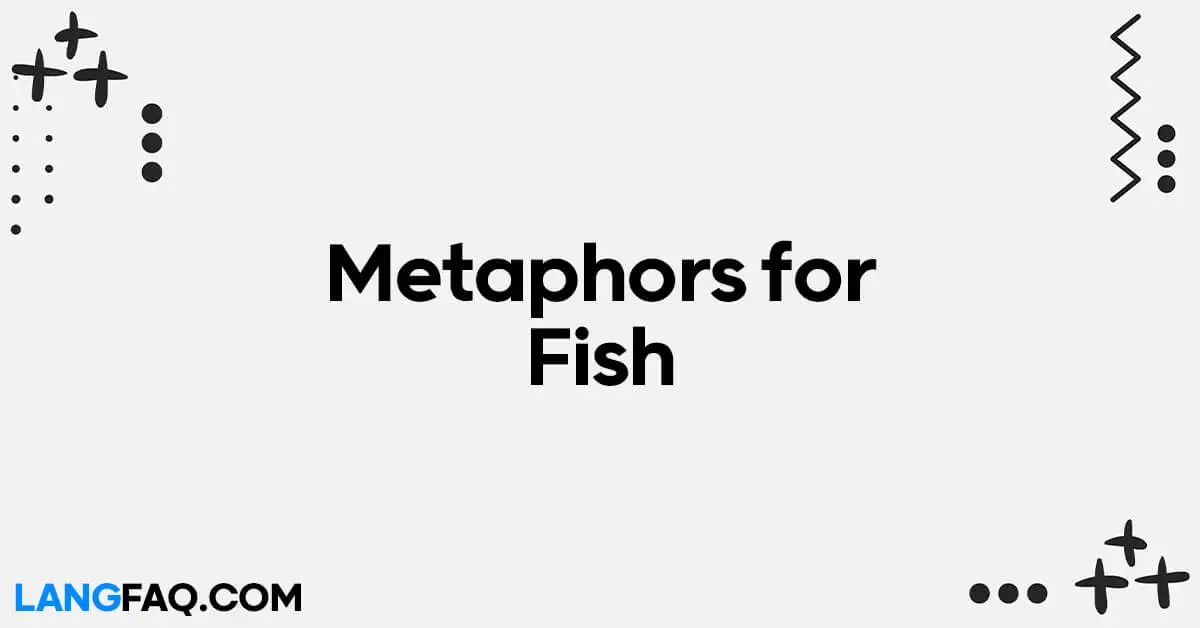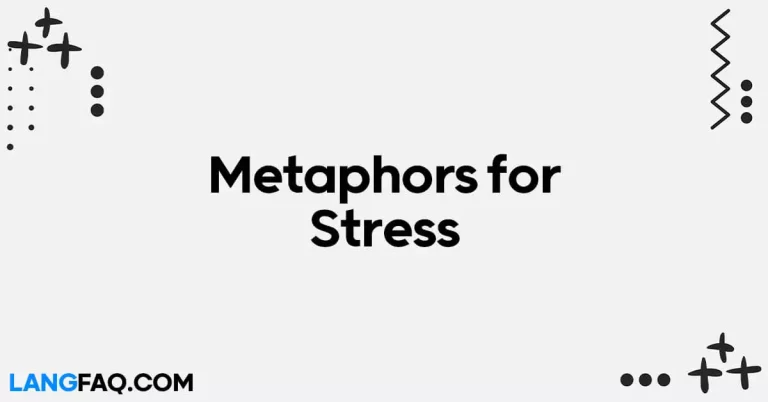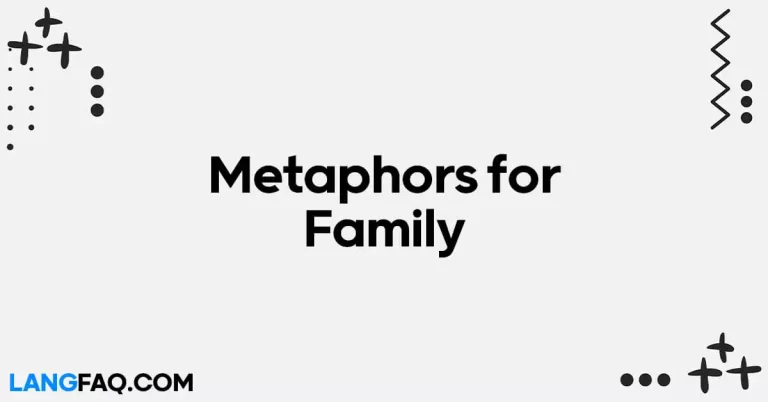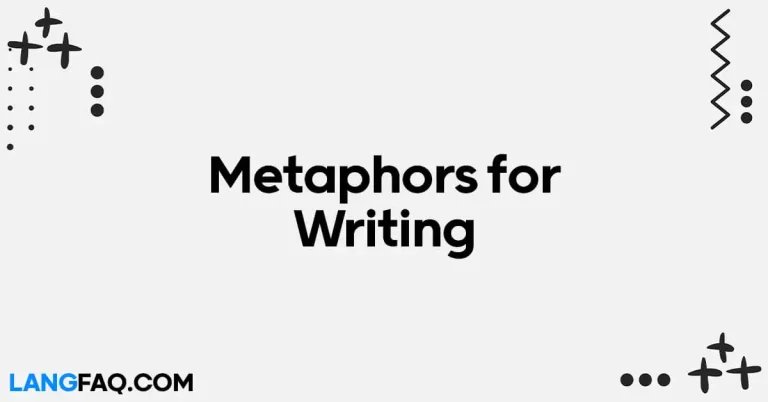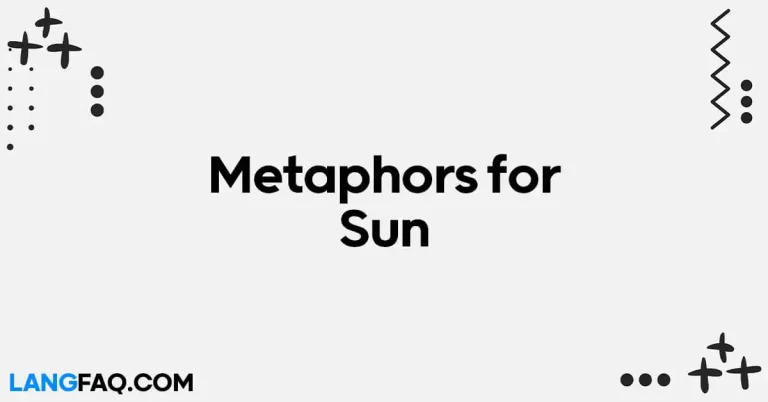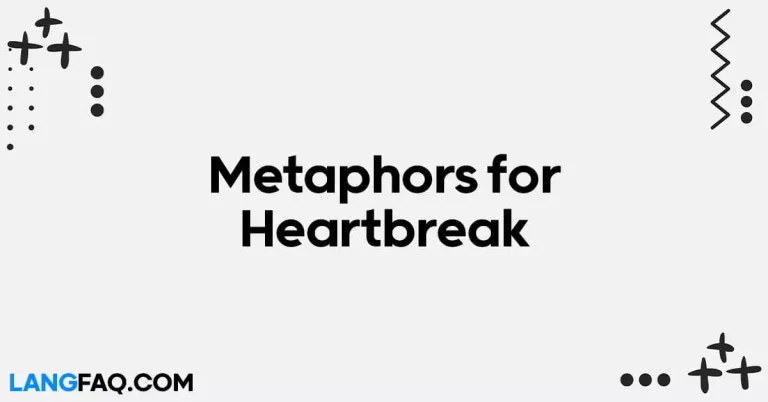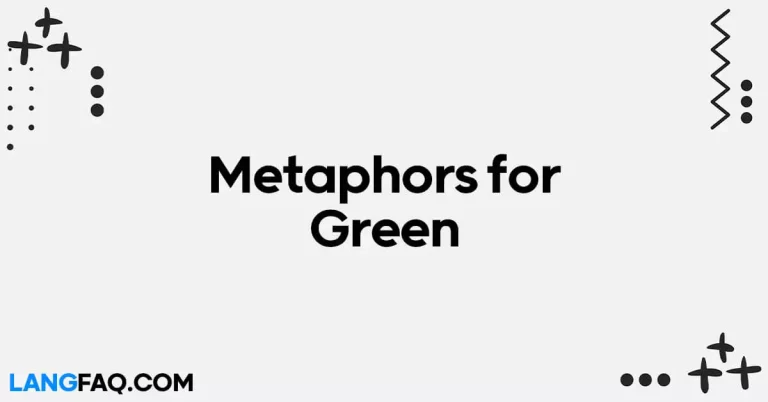Welcome to a fascinating journey through the symbolic world of fish metaphors. Fish, beyond their aquatic existence, have inspired rich metaphors across cultures. In this exploration, we’ll unravel 26 metaphors for fish, delving into their cultural, literary, and metaphorical significance.
26 Metaphors for Fish
- Slippery as an Eel: Describing something elusive or challenging to grasp.
- Like a Fish Out of Water: Signifying discomfort or unease in unfamiliar situations.
- Swimming Against the Current: Representing resilience and perseverance in adversity.
- In the Same Boat: Sharing a common situation or experience with others.
- A Small Fish in a Big Pond: Feeling insignificant in a large or competitive environment.
- Like Shooting Fish in a Barrel: Referring to an easy or effortless task.
- A Fishy Situation: Describing something suspicious or questionable.
- A Big Fish in a Small Pond: Indicating importance or prominence in a limited context.
- Sleeping with the Fishes: A euphemism for being dead or in a dangerous situation.
- Cold Fish: Describing someone as emotionally distant or unresponsive.
- Fish or Cut Bait: Urging someone to take decisive action or make a choice.
- Like a Fish to Water: Adapting quickly and naturally to a new environment or situation.
- Plenty of Fish in the Sea: Encouraging optimism and the belief in abundant opportunities.
- A Fisherman’s Tale: Referring to a story that may be exaggerated or embellished.
- Like a Fish in a Net: Feeling trapped or caught in a difficult situation.
- A Fish-eye View: Seeing something from a unique or different perspective.
- The Big Fish in the Room: Referring to the most significant or influential presence in a situation.
- A Red Herring: A misleading clue or distraction, leading away from the real issue.
- Fish for Compliments: Seeking praise or validation from others.
- Fish in Troubled Waters: Facing challenges or difficulties in a particular situation.
- Like a Fish Market: Describing a chaotic or noisy environment.
- Fishscale: Referring to something with a unique or intricate pattern, like fish scales.
- A Fish Tale: A story that is exaggerated or not entirely true.
- Fish or Fowl: Referring to something unconventional or out of the ordinary.
- Like a Fish on a Hook: Feeling caught or trapped in a challenging situation.
- Fish in Full Color: Describing something vivid, vibrant, and lively.
These metaphors showcase the versatility and richness of language when it comes to symbolizing various aspects of life through the metaphorical lens of fish.
| Metaphor | Meaning | Example |
|---|---|---|
| Slippery as an Eel | Elusive or challenging to grasp | His explanation was as slippery as an eel. |
| Like a Fish Out of Water | Discomfort in unfamiliar situations | In the bustling city, she felt like a fish out of water. |
| Swimming Against the Current | Resilience and perseverance in adversity | Facing criticism, she kept swimming against the current. |
| In the Same Boat | Sharing a common situation or experience with others | We’re all in the same boat during this challenging time. |
| A Small Fish in a Big Pond | Feeling insignificant in a large or competitive environment | In the corporate world, he was just a small fish in a big pond. |
| Like Shooting Fish in a Barrel | An easy or effortless task | Solving that math problem was like shooting fish in a barrel. |
| A Fishy Situation | Something suspicious or questionable | The whole deal seemed like a fishy situation. |
| A Big Fish in a Small Pond | Importance or prominence in a limited context | He’s a big fish in a small pond in the local art scene. |
| Sleeping with the Fishes | Euphemism for being dead or in a dangerous situation | After crossing the mob, he ended up sleeping with the fishes. |
| Cold Fish | Emotionally distant or unresponsive | Despite her smile, she could be as cold as a fish. |
| Fish or Cut Bait | Urging someone to take decisive action or make a choice | It’s time to decide—either fish or cut bait. |
| Like a Fish to Water | Adapting quickly and naturally to a new environment | She took to the new job like a fish to water. |
| Plenty of Fish in the Sea | Encouraging optimism and belief in abundant opportunities | Don’t worry about the breakup; there are plenty of fish in the sea. |
| A Fisherman’s Tale | A story that may be exaggerated or embellished | His recount of the adventure sounded like a fisherman’s tale. |
| Like a Fish in a Net | Feeling trapped or caught in a difficult situation | Debt can make you feel like a fish in a net. |
| A Fish-eye View | Seeing something from a unique or different perspective | His unconventional approach provided a fish-eye view of the problem. |
| The Big Fish in the Room | The most significant or influential presence in a situation | Despite being new, she was the big fish in the room. |
| A Red Herring | A misleading clue or distraction, leading away from the real issue | The suspect’s alibi turned out to be a red herring. |
| Fish for Compliments | Seeking praise or validation from others | Don’t fish for compliments; let your work speak for itself. |
| Fish in Troubled Waters | Facing challenges or difficulties in a particular situation | The company navigated as a fish in troubled waters during the crisis. |
| Like a Fish Market | Describing a chaotic or noisy environment | The classroom was like a fish market during the group activity. |
| Fishscale | Referring to something with a unique or intricate pattern, like fish scales | The gown was adorned with beautiful fishscale embroidery. |
| A Fish Tale | A story that is exaggerated or not entirely true | His explanation sounded more like a fish tale than reality. |
| Fish or Fowl | Referring to something unconventional or out of the ordinary | Their family traditions were a bit fish or fowl compared to others. |
| Like a Fish on a Hook | Feeling caught or trapped in a challenging situation | The unexpected question left him feeling like a fish on a hook. |
| Fish in Full Color | Describing something vivid, vibrant, and lively | The artist captured the scene with fish in full color in the painting. |
These examples provide a clearer understanding of how each metaphor is used in different contexts to convey specific meanings.
Slippery as an Eel: Navigating the Elusive
Navigating conversations or situations with someone who’s as slippery as an eel can be a challenging experience. In formal contexts, dealing with elusive individuals in a professional setting may require additional tact. The phrase “slippery as an eel” is often used to describe someone who’s difficult to pin down, either in conversation or when it comes to commitments.
When to Use:
- Formal Context: In professional settings, when addressing colleagues or clients who are avoiding commitments or not providing clear answers.
- Informal Context: While discussing elusive individuals in casual conversations, perhaps when sharing anecdotes with friends.
Example Sentence:
Formal: “During the project meeting, we found the client to be as slippery as an eel, avoiding any concrete commitments on the deliverables.”
Informal: “I tried asking him about his plans for the weekend, but he’s as slippery as an eel; wouldn’t give a straight answer!”
Tips:
- Be Diplomatic: When addressing elusive behavior, maintain a diplomatic tone to avoid unnecessary conflicts.
- Clarify Expectations: Clearly communicate expectations to avoid misunderstandings and ensure accountability.
Like a Fish Out of Water: Navigating Uncomfortable Environments
The metaphor “like a fish out of water” captures the feeling of discomfort in unfamiliar situations. Whether you’re in a new job, a social gathering, or a challenging project, this expression can vividly convey the unease experienced.
When to Use:
- Formal Context: When discussing adaptation challenges during team meetings or corporate training sessions.
- Informal Context: Sharing personal experiences of feeling out of place with friends or family.
Example Sentence:
Formal: “In the initial phase of the merger, employees felt like fish out of water, adjusting to new processes and management styles.”
Informal: “At the networking event, I was like a fish out of water, not knowing anyone and feeling completely out of place.”
Tips:
- Emphasize Growth: Highlight how being a fish out of water can lead to personal and professional growth.
- Encourage Openness: In team settings, create an environment where team members feel comfortable expressing their challenges.
Swimming Against the Current: Embracing Resilience
The metaphor “swimming against the current” beautifully encapsulates the concept of resilience and determination in the face of adversity. In both formal and informal contexts, this phrase can inspire individuals facing challenges to persevere.
When to Use:
- Formal Context: Encouraging team members during project setbacks or company-wide challenges.
- Informal Context: Offering support to friends going through personal difficulties.
Example Sentence:
Formal: “Despite the setbacks, the team displayed remarkable resilience, as if they were swimming against the current.”
Informal: “I know you’re going through a tough time, but remember, you can swim against the current and come out stronger.”
Tips:
- Acknowledge Efforts: Recognize and acknowledge the efforts of individuals facing challenges.
- Provide Resources: Ensure that individuals have the necessary resources and support to navigate difficulties.
In the Same Boat: Navigating Common Challenges
“In the same boat” is a metaphor often used to convey a shared experience or challenge. This expression fosters a sense of unity and camaraderie, emphasizing that everyone is facing a similar situation together.
When to Use:
- Formal Context: Addressing shared challenges within a team or department during a presentation or meeting.
- Informal Context: Discussing common struggles with friends or family to create a bond over shared experiences.
Example Sentence:
Formal: “As a company, we are all in the same boat when it comes to adapting to the market changes.”
Informal: “Let’s not stress too much; we’re all in the same boat, figuring out this new normal together.”
Tips:
- Promote Team Spirit: Use the metaphor to instill a sense of unity and teamwork within a group.
- Highlight Solutions: After acknowledging shared challenges, discuss potential solutions to boost morale.
A Small Fish in a Big Pond: Navigating a Competitive Environment
Feeling like a small fish in a big pond is a common sentiment when confronted with a competitive or overwhelming situation. In both formal and informal settings, this metaphor can articulate the challenge of standing out in a large or highly competitive environment.
When to Use:
- Formal Context: Discussing market competition or industry challenges during a business presentation.
- Informal Context: Sharing personal experiences of competition within a group of friends or peers.
Example Sentence:
Formal: “Entering the global market, we recognize that we are a small fish in a big pond, but we have unique offerings to make us stand out.”
Informal: “In this city full of talented musicians, I sometimes feel like a small fish in a big pond, but I keep honing my skills.”
Tips:
- Focus on Uniqueness: Emphasize unique qualities or strengths that set individuals or entities apart.
- Encourage Continuous Improvement: Suggest ongoing development to enhance skills and competencies.
Like Shooting Fish in a Barrel: Describing an Effortless Task
The phrase “like shooting fish in a barrel” is used to describe a task that is exceptionally easy or straightforward. This metaphor can be effectively employed in various situations, highlighting simplicity or lack of challenge.
When to Use:
- Formal Context: Discussing successful and efficient processes in a business setting.
- Informal Context: Sharing personal achievements or accomplishments with friends or family.
Example Sentence:
Formal: “Implementing the new software was like shooting fish in a barrel; the team adapted effortlessly.”
Informal: “Fixing the leaky faucet turned out to be like shooting fish in a barrel – a quick and easy job!”
Tips:
- Celebrate Efficiency: Use the metaphor to celebrate and recognize efficient processes or accomplishments.
- Acknowledge Team Effort: If applicable, attribute the ease to effective teamwork or collaboration.
A Fishy Situation: Navigating Suspicion and Uncertainty
“A fishy situation” is a metaphor that suggests something suspicious or questionable. This expression is commonly used in both formal and informal contexts when addressing uncertainties or questionable circumstances.
When to Use:
- Formal Context: Discussing potential risks or uncertainties during a business presentation or risk assessment meeting.
- Informal Context: Sharing suspicions or concerns with friends or family regarding a situation.
Example Sentence:
Formal: “Our audit revealed a few financial discrepancies, pointing to a fishy situation that requires further investigation.”
Informal: “I received an email asking for personal information; it felt like a fishy situation, so I reported it to the security team.”
Tips:
- Prioritize Investigation: In formal settings, emphasize the importance of investigating any fishy situations promptly.
- Share Concerns: Encourage open communication in informal contexts, ensuring that suspicions are shared and addressed.
A Big Fish in a Small Pond: Navigating Limited Contexts
Feeling like a big fish in a small pond conveys a sense of importance or prominence in a specific, limited context. This metaphor is versatile and can be applied in both formal and informal situations.
When to Use:
- Formal Context: Discussing individual or company achievements in a smaller market or niche.
- Informal Context: Humorously acknowledging a sense of importance within a specific group of friends or colleagues.
Example Sentence:
Formal: “While we may be a big fish in a small pond locally, our goal is to expand and become a prominent player in the global market.”
Informal: “In our small writing group, he’s the big fish in a small pond, always coming up with the most creative ideas.”
Tips:
- Highlight Achievements: Emphasize specific achievements that contribute to the feeling of being a big fish.
- Encourage Ambition: In formal settings, express ambitions for growth and expansion beyond the current context.
Sleeping with the Fishes: Navigating Dark Scenarios
“Sleeping with the fishes” is a metaphor often used as a euphemism for being dead or in a dangerous situation. While it might be more commonly associated with informal contexts, it can also be employed metaphorically in a formal setting.
When to Use:
- Formal Context: Discussing the potential risks or consequences of certain actions in a serious business meeting.
- Informal Context: Humorously referencing a challenging situation with friends or family.
Example Sentence:
Formal: “If we don’t address these security vulnerabilities, our data might end up sleeping with the fishes – a catastrophic scenario for our company.”
Informal: “Forgot to submit the report? You’ll be sleeping with the fishes if the boss finds out!”
Tips:
- Use with Caution: Given its dark undertones, use this metaphor sparingly in formal settings.
- Inject Humor: In informal contexts, the phrase can be used humorously to lighten the mood, but always be mindful of sensitivities.
Cold Fish: Navigating Emotional Distance
Describing someone as a “cold fish” implies emotional distance or unresponsiveness. Whether used in a formal or informal setting, this metaphor paints a vivid picture of a person who lacks warmth or empathy.
When to Use:
- Formal Context: Addressing interpersonal dynamics within a team or during a performance review.
- Informal Context: Discussing personal relationships or encounters where someone appeared emotionally distant.
Example Sentence:
Formal: “In client interactions, being perceived as a cold fish can impact customer satisfaction; cultivating warmth is crucial for effective communication.”
Informal: “I tried talking to her about my struggles, but she was a bit of a cold fish – didn’t show much empathy.”
Tips:
- Encourage Open Communication: In both settings, promote open dialogue to address and overcome emotional distance.
- Highlight the Importance of Empathy: Emphasize the significance of empathy in fostering positive relationships.
Fish or Cut Bait: Navigating Decision-Making
The phrase “fish or cut bait” is a metaphor urging someone to make a decision or take decisive action. This expression can be impactful in various contexts, emphasizing the need for clear choices.
When to Use:
- Formal Context: Encouraging team members or colleagues to make decisions during a project or strategy meeting.
- Informal Context: Urging friends or family to make a choice or commitment in a personal situation.
Example Sentence:
Formal: “In this critical phase of the project, it’s time for everyone to decide – either fish or cut bait; indecision will only hinder progress.”
Informal: “We’ve been discussing vacation plans for weeks; it’s time to fish or cut bait and book those tickets!”
Tips:
- Emphasize Accountability: Use the metaphor to stress the importance of taking responsibility for decisions.
- Set Clear Deadlines: Encourage a timely decision-making process to avoid prolonged indecision.
Like a Fish to Water: Navigating Adaptation
The phrase “like a fish to water” is a metaphor indicating a natural and effortless adaptation to a new environment. This expression can be used to highlight quick learning or seamless integration.
When to Use:
- Formal Context: Commending team members on swift adaptation during a transition or change.
- Informal Context: Sharing personal experiences of acclimating easily to new situations.
Example Sentence:
Formal: “Our new team member took to the project like a fish to water, showcasing impressive adaptability and a quick learning curve.”
Informal: “Started a new hobby last week, and I took to it like a fish to water – feels like I’ve been doing it forever!”
Tips:
- Celebrate Adaptability: Use the metaphor to celebrate and encourage adaptive behaviors.
- Recognize Learning Curve: Acknowledge and highlight the ease with which individuals adapt to new challenges.
Plenty of Fish in the Sea: Navigating Optimism and Opportunities
“Plenty of fish in the sea” is a metaphor encouraging optimism and belief in abundant opportunities, especially in the realm of relationships. This expression is versatile and can be applied in both formal and informal contexts.
When to Use:
- Formal Context: Motivating team members during challenging projects by emphasizing the availability of alternative solutions.
- Informal Context: Consoling friends after a breakup, suggesting there are many other potential partners.
Example Sentence:
Formal: “While our current approach faces challenges, let’s remember there are plenty of fish in the sea – alternative strategies that can lead to success.”
Informal: “I know the breakup is tough, but don’t worry, there are plenty of fish in the sea, and you’ll find someone better suited for you.”
Tips:
- Foster Resilience: In both settings, use the metaphor to instill resilience and a positive outlook.
- Encourage Exploration: Emphasize the importance of exploring various options before settling on a particular solution.
A Fisherman’s Tale: Navigating Narrative Exaggeration
The phrase “a fisherman’s tale” refers to a story that may be exaggerated or embellished. This metaphor is apt in both formal and informal settings to discuss situations where details might be stretched for effect.
When to Use:
- Formal Context: Advising against hyperbole in marketing or sales presentations, ensuring truthful representations.
- Informal Context: Playfully acknowledging a friend’s tendency to exaggerate stories for entertainment.
Example Sentence:
Formal: “In our advertising campaigns, let’s avoid creating a fisherman’s tale and focus on genuine, transparent communication with our customers.”
Informal: “John’s fishing trip stories are classic fisherman’s tales – entertaining, but who knows how big that fish really was!”
Tips:
- Prioritize Transparency: In formal settings, stress the importance of honest communication.
- Celebrate Creativity: In informal contexts, appreciate the entertainment value of exaggeration while keeping the audience in on the fun.
Like a Fish in a Net: Navigating Feelings of Entrapment
The metaphor “like a fish in a net” describes a feeling of being trapped or caught in a difficult situation. This expression is versatile and can be applied in both formal and informal contexts.
When to Use:
- Formal Context: Discussing challenges faced by a project team and strategizing to overcome obstacles.
- Informal Context: Expressing personal struggles to friends or family members.
Example Sentence:
Formal: “The economic downturn has left us feeling like fish in a net; however, with strategic planning, we can find ways to break free and thrive.”
Informal: “I missed the deadline, and now I’m caught in a tight spot, feeling like a fish in a net; any advice on how to navigate this?”
Tips:
- Encourage Collaboration: In both settings, suggest collaborative efforts to overcome challenges.
- Highlight Solutions: Focus on finding actionable solutions to alleviate feelings of entrapment.
A Fish-eye View: Navigating Unique Perspectives
“A fish-eye view” refers to seeing something from a unique or different perspective. This metaphor is valuable in both formal and informal contexts to encourage diverse thinking and innovative approaches.
When to Use:
- Formal Context: Discussing the importance of diverse perspectives in problem-solving during team meetings or strategy sessions.
- Informal Context: Sharing personal experiences that offer a unique viewpoint on a common issue.
Example Sentence:
Formal: “Encouraging a fish-eye view within our team can lead to innovative solutions, as different perspectives contribute to a more comprehensive strategy.”
Informal: “Having worked in various departments gives me a fish-eye view on how the company operates as a whole.”
Tips:
- Celebrate Diversity: In both settings, highlight the value of diverse perspectives and experiences.
- Encourage Open Communication: Create an environment where individuals feel comfortable sharing their unique viewpoints.
The Big Fish in the Room: Navigating Prominence
“The big fish in the room” refers to the most significant or influential presence in a situation. This metaphor is effective in both formal and informal settings to acknowledge a prominent figure or entity.
When to Use:
- Formal Context: Recognizing a key player during a business presentation or conference.
- Informal Context: Playfully acknowledging the most influential person at a social gathering.
Example Sentence:
Formal: “In the world of technology, acknowledging major industry players is crucial; today, we have the big fish in the room joining us for a keynote address.”
Informal: “At our family reunion, Uncle Joe is the big fish in the room, always telling the most entertaining stories.”
Tips:
- Acknowledge Contributions: In both settings, express appreciation for the impact of the prominent figure.
- Facilitate Networking: Encourage connections with influential individuals for potential collaborations or partnerships.
A Red Herring: Navigating Misdirection
“A red herring” is a metaphor for a misleading clue or distraction leading away from the real issue. This expression is versatile and applicable in both formal and informal contexts.
When to Use:
- Formal Context: Discussing potential challenges or distractions in a project management setting.
- Informal Context: Playfully addressing diversions in everyday conversations.
Example Sentence:
Formal: “Identifying and addressing red herrings in our project planning is essential to stay on track and meet our goals efficiently.”
Informal: “Let’s not get caught up in red herrings during our discussion; we need to focus on the main issue at hand.”
Tips:
- Prioritize Focus: In both settings, emphasize the importance of staying focused on the main objectives.
- Promote Critical Thinking: Encourage team members to critically evaluate information to avoid falling for red herrings.
Fish for Compliments: Navigating the Desire for Recognition
The phrase “fish for compliments” describes the act of seeking praise or validation from others. This metaphor can be used in both formal and informal contexts to address the importance of genuine recognition.
When to Use:
- Formal Context: Discussing the significance of acknowledging and appreciating team members’ contributions in a workplace presentation.
- Informal Context: Playfully addressing someone who constantly seeks praise in a casual conversation.
Example Sentence:
Formal: “In our corporate culture, we encourage recognizing achievements authentically, steering away from the need to fish for compliments.”
Informal: “Every time she shows us her artwork, she’s fishing for compliments – maybe we should genuinely acknowledge her talent this time!”
Tips:
- Promote Authenticity: In both settings, emphasize the value of genuine compliments over forced praise.
- Encourage Positive Feedback: Create an environment where individuals feel comfortable expressing appreciation for each other’s efforts.
Fish in Troubled Waters: Navigating Challenges
The metaphor “fish in troubled waters” signifies facing challenges or difficulties in a particular situation. This expression is adaptable for use in both formal and informal settings to address navigating tough circumstances.
When to Use:
- Formal Context: Discussing challenges faced by a project team and strategizing solutions during a business meeting.
- Informal Context: Sharing personal struggles with friends or family members.
Example Sentence:
Formal: “Our team is currently a fish in troubled waters, but with collaborative effort and strategic planning, we can overcome these challenges.”
Informal: “Lately, my finances have me feeling like a fish in troubled waters; any advice on how to navigate through this tough situation?”
Tips:
- Stress Resilience: In both settings, highlight the importance of resilience when facing challenges.
- Foster Team Collaboration: Encourage collaboration to collectively navigate and overcome troubled waters.
Like a Fish Market: Navigating Chaos
The phrase “like a fish market” describes a chaotic or noisy environment. This metaphor can be employed in both formal and informal contexts to illustrate disorder or commotion.
When to Use:
- Formal Context: Addressing the need for organized communication within a team during a project review.
- Informal Context: Humorously describing a lively and noisy social gathering.
Example Sentence:
Formal: “In client meetings, maintaining professionalism is crucial; we must avoid our communication turning into a fish market, ensuring clarity and efficiency.”
Informal: “The school fair was like a fish market – laughter, chatter, and music everywhere; it was a great celebration!”
Tips:
- Emphasize Communication Etiquette: In both settings, stress the importance of maintaining clear and organized communication.
- Celebrate Vibrancy: In informal contexts, appreciate the liveliness of chaotic environments, framing it positively.
Fishscale: Navigating Uniqueness and Intricacy
“Fishscale” refers to something with a unique or intricate pattern, resembling the scales of a fish. This metaphor is versatile and can be applied in both formal and informal contexts to describe intricate details or patterns.
When to Use:
- Formal Context: Discussing the distinctive features of a product or design during a business presentation.
- Informal Context: Complimenting someone’s unique sense of style or artwork.
Example Sentence:
Formal: “Our new product design incorporates a fishscale pattern, showcasing the attention to detail and uniqueness that sets us apart in the market.”
Informal: “I love your dress; the fabric has this beautiful fishscale pattern, making it stand out from the usual designs.”
Tips:
- Highlight Uniqueness: In both settings, emphasize the distinctiveness or intricacy of the subject.
- Encourage Creative Expression: Support and appreciate creative endeavors that showcase a fishscale-like uniqueness.
A Fish Tale: Navigating Exaggeration
“A fish tale” is a metaphor for a story that is exaggerated or not entirely true. This expression can be effectively employed in both formal and informal contexts to caution against embellishing narratives.
When to Use:
- Formal Context: Advising against hyperbole in marketing or sales presentations to maintain credibility.
- Informal Context: Playfully addressing a friend’s tendency to exaggerate stories for entertainment.
Example Sentence:
Formal: “In our marketing campaign, let’s ensure our storytelling remains authentic; steering clear of a fish tale will build trust with our audience.”
Informal: “Jim’s fishing stories are entertaining, but we all know they’re just fish tales – a bit exaggerated for dramatic effect!”
Tips:
- Prioritize Truthfulness: In both settings, stress the importance of honest and accurate communication.
- Use Humor Sparingly: In informal contexts, inject humor to address exaggeration without causing discomfort.
Fish or Fowl: Navigating Unconventionality
“Fish or fowl” refers to something unconventional or out of the ordinary. This metaphor can be applied in both formal and informal contexts to describe unique situations or relationships.
When to Use:
- Formal Context: Discussing unconventional business strategies during a corporate strategy meeting.
- Informal Context: Describing an unusual family tradition during a casual conversation.
Example Sentence:
Formal: “Our new marketing approach may seem fish or fowl initially, but the data suggests it could be a groundbreaking strategy for our industry.”
Informal: “Our holiday traditions are a bit fish or fowl compared to others – we celebrate Christmas on a camping trip!”
Tips:
- Celebrate Uniqueness: In both settings, appreciate and celebrate unconventional aspects that bring diversity.
- Explain Context: Provide context or reasoning behind unconventional choices to enhance understanding.
Big Fish, Small Pond: Navigating Relative Importance
“Big fish, small pond” signifies being a significant or influential figure in a limited or local context. This metaphor is applicable in both formal and informal settings to describe one’s relative importance.
When to Use:
- Formal Context: Recognizing individual or company achievements within a specific market or niche during a business presentation.
- Informal Context: Playfully acknowledging personal significance in a smaller group or community.
Example Sentence:
Formal: “While we may be a big fish in a small pond locally, our goal is to expand and become a prominent player in the global market.”
Informal: “In our small writing group, she’s the big fish in a small pond, always coming up with the most creative ideas.”
Tips:
- Emphasize Growth: In both settings, express ambitions for expansion beyond the current context.
- Acknowledge Contributions: Recognize and appreciate the impact of being a big fish in a specific pond.
Fish out of Water: Navigating Uncomfortable Situations
Feeling like a “fish out of water” conveys discomfort in unfamiliar situations. This metaphor is adaptable for use in both formal and informal contexts to describe the challenge of adapting to new environments.
When to Use:
- Formal Context: Discussing adaptation challenges during team meetings or corporate training sessions.
- Informal Context: Sharing personal experiences of feeling out of place with friends or family.
Example Sentence:
Formal: “In the initial phase of the merger, employees felt like fish out of water, adjusting to new processes and management styles.”
Informal: “At the networking event, I was like a fish out of water, not knowing anyone and feeling completely out of place.”
Tips:
- Encourage Adaptability: In both settings, emphasize the importance of adapting to new challenges.
- Provide Support: Offer guidance or support for individuals who may feel like a fish out of water.
There Are Plenty of Other Fish in the Sea: Navigating Rejection
The saying “plenty of other fish in the sea” is commonly used to console someone facing rejection or a failed relationship. This metaphor is versatile and suitable for both formal and informal contexts.
When to Use:
- Formal Context: Addressing setbacks or rejections during a project review or team debriefing.
- Informal Context: Comforting a friend going through a breakup or disappointment.
Example Sentence:
Formal: “While our proposal faced rejection this time, let’s remember there are plenty of other opportunities in the sea of possibilities.”
Informal: “I know the job interview didn’t go well, but don’t worry, there are plenty of other fish in the sea – a better opportunity is waiting for you.”
Tips:
- Provide Encouragement: In both settings, offer words of encouragement and optimism.
- Highlight Opportunities: Emphasize the abundance of possibilities beyond the current setback.
FAQ Section
Are fish metaphors universal? Fish metaphors transcend cultural boundaries, resonating across languages and societies. They serve as universal symbols that connect diverse cultures through shared human experiences.
How do fish metaphors impact language? Fish metaphors enrich language by providing vivid imagery and conveying complex ideas in a concise and relatable manner. They add depth to communication and facilitate better understanding.
Can fish metaphors be negative? While many fish metaphors carry positive connotations, some, like “a fish out of water,” can imply discomfort or unease. Context plays a crucial role in determining the overall sentiment of these metaphors.
Do all cultures view fish metaphors similarly? While some metaphors may have common themes, cultural nuances influence interpretations. Different cultures may attribute varying symbolic meanings to fish metaphors based on their unique perspectives.
How do fish metaphors appear in literature? Fish metaphors feature prominently in literature, serving as powerful literary devices to convey themes of struggle, resilience, and the complexity of human experiences. Writers use these metaphors to evoke emotion and engage readers.
Can fish metaphors change over time? Yes, the meanings of fish metaphors can evolve with societal changes. Cultural shifts, new experiences, and evolving perspectives contribute to the dynamic nature of these metaphors.
Conclusion
In this deep dive into the sea of metaphors, we’ve explored the symbolic richness that fish bring to language and culture. From the slippery slope of life’s challenges to the unity in a shoal, each metaphor paints a unique portrait. As we conclude our journey, let these metaphors swim in your thoughts, adding a splash of creativity to your linguistic palette.

